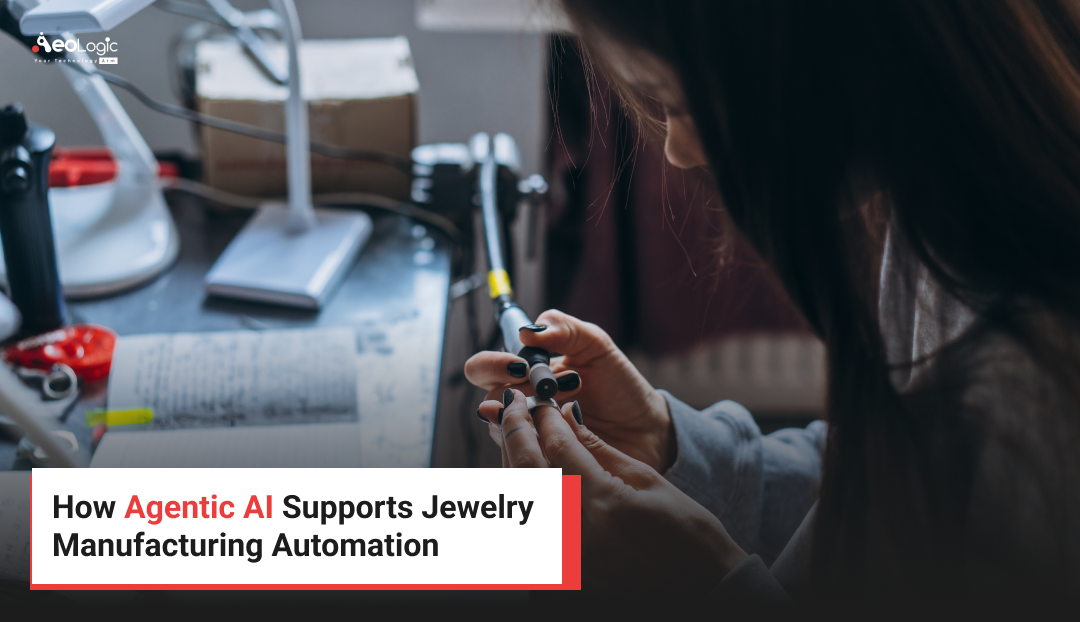Jewelry manufacturing AI is a beautiful mix of creativity, accuracy, and expanded logistics. From sourcing of precious materials to crafting of custom designs, the process demands extraordinary coordination and skills at every step. But with rising customer expectations and a market that moves faster than ever, traditional methods are struggling to keep up. That’s where agentic AI solutions make a real difference. Unlike basic automation equipment, agents bring some smarts to the AI solution table. These systems not only follow the instructions – they can learn the informed decisions in real time, adapt, and do it. This means that more efficient workflows, lower errors, and scalable operations without compromising on craftsmanship or quality.
The jewelry industry has long celebrated human touch – from the trained eye of the gemologist to the stable hand of the artisan. However, to give individual, high-quality pieces on speed and scale, growing pressure manufacturers to detect intelligent devices that increase every stage of the process. Agentic AI solutions are emerging as an ideal partner, not to change human expertise, but to support it with accurate foresight and tireless stability. Imagine a system that can destroy anomalies in GEM grading before a mistake, before reaching the customer, optimize a production line on the basis of real-time supply fluctuations, or even anticipate which designs are likely to have a trend in the next season based on global purchase behavior.
These are no longer the possibilities of the future – they are today’s competitive edges. Additionally, as luxury consumers become more conscious of moral sourcing and transparency, the agent AI can track the origin and travel of each component, ensuring that brands meet the highest standards of stability and trust. For manufacturers, this means high customer confidence and low compliance headaches. In this post, we will find out how jewelry manufacturing AI is helping luxury brands and manufacturers to reimagine.
What Is Agentic AI?
At its core, agentic AI is a form of artificial intelligence designed to function independently. This responds to changes, thinks through decisions, and continuously improves learning from previous experience.
In the context of jewelry manufacturing AI, this could mean:
- Tracking gemstone shipments in real time
- Adjusting casting schedules based on available machines or materials
- Catching finishing flaws before they go out the door
Think as adding it to a smart, proactive partner in your production line – one who always works, always learns, and is always ready for help. What agents makes AI different from traditional automation is its autonomy and adaptability. While the traditional automation follows predetermined rules or workflows, the agent can explain AI data, assess conditions, and make decisions that are not clearly programmed. It operates like a member of a reliable team with statusal awareness – identifying the pattern, apprehending issues, and making intelligent adjustments on the fly. For example, if a special gem shipment is delayed, an agent AI system can immediately reorganize the production program, suggest alternative workflows, or trigger reords from secondary suppliers – without waiting for human intervention. If it detects a recurring defect in a polishing process, it can alert quality control teams, recommend maintenance, or even temporarily stop that line until the problem is resolved.
Agent AI also thrives on the response loops. The more it operates, the more it learns. Over time, it becomes better to predict challenges and optimize the results. This level of proactive intelligence is game-changing in high-dacoit industries such as luxury jewelry, where a minor defects can also result in expensive or lost customer trusts. In addition, agents can be integrated into AI departments – from design to sales – creating an integrated ecosystem where insight is continuously shared and used to inform intelligent decisions. This allows connectivity manufacturers to reduce silos, improve cooperation and distribute better products with speed and confidence.
Everyday Challenges in jewelry manufacturing AI
Even the most well-established jewelry makers deal with a set of common issues:
Delays in sourcing precious metals and stones
Global supply chains for luxury materials are notoriously complex. A single delay in sourcing a rare gemstone or a specific grade of gold can hold up an entire production line. Factors such as geopolitical instability, fluctuating market prices, and transportation bottlenecks make timely procurement a constant challenge.
Manual workflows that slow down production
Many jewelry workshops still rely on traditional, paper-based tracking systems or disconnected software tools. This slows down everything—from approvals to inventory management—and makes it difficult to respond to unexpected changes. When craftsmanship meets inefficiency, the result is longer lead times and missed opportunities.
Quality inconsistencies due to human error
In a business where one microscopic flaw can determine whether a product meets luxury standards, consistency is key. But human error—especially in repetitive tasks like inspection or polishing—can lead to variations in quality, increased rework, and even costly returns or reputational damage.
Difficulty scaling custom or personalized orders
The demand for one-of-a-kind or made-to-order pieces is growing rapidly, especially in the luxury segment. Yet most traditional systems aren’t designed to handle personalization at scale. Custom requests often require manual adjustments, leading to higher costs, longer delivery times, and more room for error.
Limited visibility into the full supply chain
Tracking the journey of each component—from mine to market—is critical not only for inventory management, but also for meeting ethical sourcing standards. Without full visibility, it becomes harder to ensure compliance, avoid counterfeit materials, or quickly respond to disruptions.
These challenges don’t just slow things down—they can affect customer satisfaction, reduce profit margins, and over time, erode brand reputation. Manufacturers need smarter, more agile systems to stay competitive—and that’s exactly where agentic AI solutions works.
1. Smarter Inventory and Supply Chain Management
Agent AI helps track materials ranging from sourcing to delivery like gold, silver and gems. This supplier can flag down the delay, optimize the order schedule, and ensure your inventory stays balanced—even when demand changes quickly.
Beyond real-time tracking, agentic AI uses historical data to forecast future needs, helping you avoid both overstocking and shortages. It can also automatically recommend alternative suppliers or routes in case of disruption. For companies focused on ethical sourcing, AI can verify material origin and flag inconsistencies in the supply chain, ensuring transparency and compliance with global standards.
2. Adaptive Production Scheduling
Every jewelry piece is unique. With so many variables—design, materials, timing—manual scheduling can be a headache. Agentic AI solutions dynamically builds and updates schedules based on current capacity, deadlines, and even artisan availability.
It continuously analyzes production inputs, customer deadlines, and operational constraints, adjusting in real-time as new orders come in or bottlenecks arise. This means your production floor becomes more agile, with less idle time and more efficient use of labor and equipment. Managers gain full visibility into progress, and last-minute changes are easier to absorb without throwing the entire schedule off balance.
3. Automated Quality Control
When quality is everything, even the smallest defect matters. With advanced image analysis and machine learning, AI agents can spot surface flaws, misalignments, or imperfections before they become problems—often with greater accuracy than the human eye.
Using Agentic AI solutions we can run 24/7 without fatigue, identifying issues that might go unnoticed in manual inspections. It also classifies the types of defects, helping manufacturers identify recurring issues tied to specific tools, materials, or techniques. This empowers continuous process improvement and ensures the final product meets the exacting standards expected in the luxury market.
4. Customization at Scale
More customers want personalized jewelry—but customization usually slows things down. Agentic AI solutions helps you scale custom production by connecting digital designs directly to production workflows, adjusting everything from materials to finishing processes on the fly.
It intelligently interprets custom requests, configures machinery settings, and adapts timelines without disrupting overall production flow. AI can also suggest upsell opportunities based on design preferences and past orders. By making personalized manufacturing as efficient as standard production, it opens up new revenue streams while meeting the rising demand for unique, made-to-order luxury.
5. Predictive Maintenance and Machine Monitoring
Jewelry production depends on specialized equipment—from polishers to 3D printers. Jewelry manufacturing AI monitors machine health in real time and can predict when something might go wrong, allowing for scheduled maintenance before a breakdown happens.
Through sensor data and machine learning, it identifies subtle patterns that signal wear and tear. This proactive approach prevents unexpected downtime, extends the life of expensive machinery, and reduces emergency repair costs. It can even schedule maintenance during low-demand periods to avoid workflow disruptions. The result is a more reliable, efficient, and cost-effective operation from end to end.
The Benefits of Agentic AI Solutions in Jewelry Manufacturing
By integrating agentic AI into your operations, you unlock:
Higher production efficiency with less waste
AI optimizes every stage of the production cycle—reducing idle time, minimizing errors, and ensuring precise material use. This leads to faster turnaround and fewer discarded resources, making operations more sustainable and cost-effective.
More consistent quality, even at scale
Agentic AI enforces strict quality standards by detecting defects early and learning from recurring patterns. This ensures every piece meets luxury-grade expectations, whether you’re producing ten or ten thousand items.
Smarter, more responsive material sourcing
AI monitors supplier performance, predicts shortages, and automates reordering based on real-time demand. This reduces lead times and helps avoid last-minute production delays due to missing materials.
Better coordination across your production and design teams
With AI-driven insights and real-time data sharing, teams can align more effectively. Design adjustments, inventory updates, and schedule changes are automatically communicated across departments, reducing friction and confusion.
The ability to scale up without increasing costs proportionally
As your business grows, agentic AI solutions helps maintain efficiency without needing to double your workforce or overhead. It streamlines workflows, handles complexity, and supports high-volume production while keeping operational costs under control.
Real-World Inspiration
While the jewelry industry is still warming up to Jewelry manufacturing AI, other industries are already seeing big wins:
Watchmakers use AI agents to manage intricate micro-assembly, ensuring flawless alignment of tiny components while reducing human fatigue and error—an approach that translates well to the precision work of fine jewelry.
Luxury fashion brands rely on smart systems to forecast demand, manage global supply chains, and streamline production without sacrificing individuality or craftsmanship. AI helps them stay agile and responsive to fast-changing consumer tastes.
Medical device makers use AI to reduce errors and ensure precision in production, where even the smallest defect can have serious consequences—similar to the stakes in luxury manufacturing.
These examples show how adaptable and powerful agentic AI can be—especially in high-precision, high-value industries like jewelry. They offer a clear path forward: embracing AI not just as a tool, but as a strategic partner that supports artisans, enhances quality, and drives innovation.
Getting Started with Agentic AI
You don’t need a complete tech overhaul to start using AI. Here’s a simple approach:
Identify one process in your operation that’s slow, repetitive, or error-prone
Work with an experienced agentic AI solutions provider
Launch a pilot—perhaps in quality control or inventory management
Review the results and identify what’s working
Scale up to other areas once you’ve seen success
Small, smart steps can lead to meaningful transformation over time.
FAQs About Jewelry Manufacturing AI
Q1: What is Jewelry Manufacturing AI?
A: Jewelry manufacturing AI refers to artificial intelligence systems specifically designed to automate and enhance various stages of jewelry production. These include tasks like CAD design optimization, gemstone sorting, casting analysis, and quality inspection. By learning from data, AI helps jewelers streamline processes, reduce waste, and improve precision—without sacrificing craftsmanship.
Q2: How does AI improve the efficiency of jewelry manufacturing?
A: AI in jewelry manufacturing speeds up production by automating time-consuming tasks such as layout planning, polishing schedules, and defect detection. It also adjusts workflows in real time based on inventory, order status, or equipment performance, minimizing downtime and reducing human error.
Q3: Can AI support custom or one-of-a-kind jewelry designs?
A: Absolutely. Jewelry manufacturing AI can analyze buyer preferences and generate multiple design options for custom orders. Designers can then use AI as a co-creative tool—refining suggestions based on aesthetic goals while the AI ensures manufacturability and cost-effectiveness.
Q4: Is AI only useful for large-scale jewelry manufacturers?
A: No. Small and boutique jewelry makers are increasingly adopting AI tools for tasks like 3D modeling assistance, pricing optimization, and stone matching. Cloud-based AI solutions make advanced tools accessible even to companies with modest tech infrastructure.
Q5: What types of tasks can Jewelry Manufacturing AI automate?
A:
- Digital design and CAD optimization
- Gemstone sorting and grading
- Real-time production tracking
- Casting temperature and pressure adjustments
- Quality control through image analysis
- Predictive maintenance for machinery
These automations reduce manual labor and improve consistency.
Q6: Does AI replace human designers and artisans?
A: Not at all. AI supports skilled professionals by removing repetitive work and offering data-driven suggestions. Human creativity and craftsmanship remain central—AI simply accelerates decision-making and ensures production feasibility.
Q7: How does Jewelry Manufacturing AI impact quality control?
A: Using computer vision and machine learning, AI can detect minute defects in metalwork, surface finish, or gemstone setting—often with greater accuracy than manual inspection. This results in fewer returns, higher customer satisfaction, and consistent product quality.
Q8: Can AI integrate with our current design software or ERP system?
A: Yes. Most jewelry manufacturing AI tools are built for integration. They can connect with CAD programs, inventory systems, and enterprise resource planning (ERP) platforms through APIs or middleware, creating a seamless end-to-end production flow.
Q9: Is investing in Jewelry Manufacturing AI cost-effective?
A: While initial setup may require budget allocation, most businesses see a return on investment (ROI) within 12–18 months. Cost savings come from reduced waste, shorter production cycles, improved quality, and better demand forecasting.
Q10: What is the future of AI in jewelry manufacturing?
A: The future is moving toward fully intelligent workshops—powered by AI that can manage dynamic orders, personalize designs at scale, and operate semi-autonomously. Innovations like generative AI for design and predictive AI for supply chain management will soon become industry standards.
Conclusion
Jewelry manufacturing is moving into a new era—where speed, personalization, and quality can exist together. Agentic AI gives you the tools to make it happen. It’s not about replacing human talent. It’s about enhancing what your team does best, eliminating inefficiencies, and building a future where your factory can think ahead, act faster, and create stunning results. If you’re ready to take the next step, partnering with a trusted agentic AI solutions provider could be the smartest investment you make. Let your production line evolve—with intelligence to use Jewelry manufacturing AI.
With Aeologic Technologies as your trusted tech solution partner, you can leverage cutting edge AI innovations to transform your contact center operations. The gen AI financial services are just beyond our imagination and have a brighter future than today. This not only improves the way of contact services but also introduces an innovation that is going to enhance the financial sector for a long time.

9+ years experienced Software Engineer with a demonstrated history of working in the information technology and services industry. Skilled in iOS,Flutter, Software Development, Objective-C, Xcode, and Swift. Strong engineering professional graduated from UPTU.






